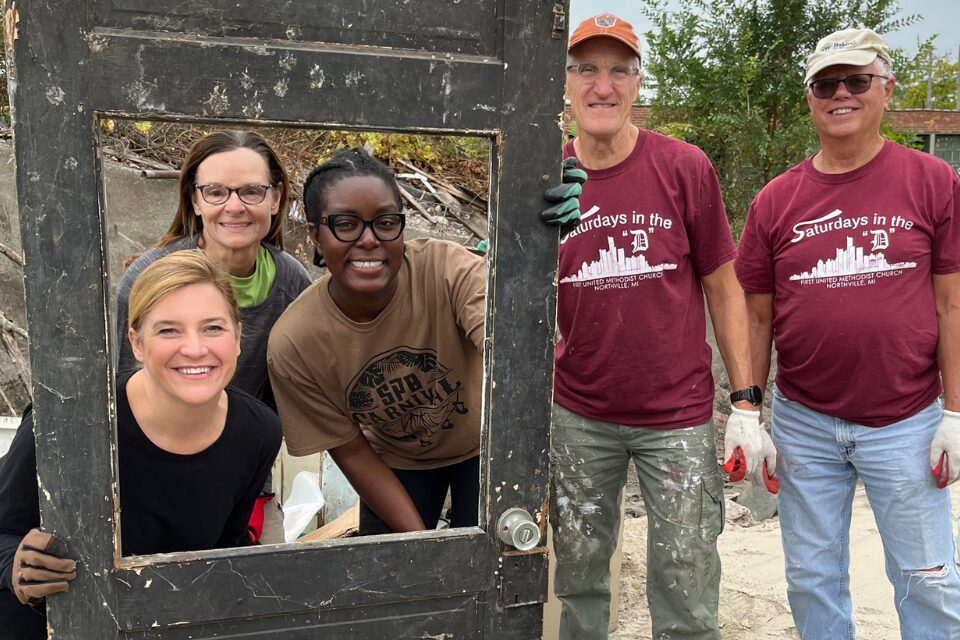After the Storm and the Michigan Conference co-sponsor a volunteer week to assist flood survivors in Detroit and provide Early Response Team basic training.
JAMES DEATON
Content Editor
The extreme weather parts of Michigan experienced this week reminds us that spring is peak tornado season. Natural disasters can strike anytime, and no community is entirely safe, but how can we help? After the Storm and the Michigan Conference will co-lead a week of service and training in Metro Detroit from April 15-19, 2024. It’s open to anyone 18 or older. You do not have to be a member of a United Methodist church to participate.
After the Storm, an affiliated nonprofit of the Michigan Conference, is coordinating a volunteer blitz from Tuesday through Friday of that week. After the Storm has become a trusted ministry partner and expert in long-term disaster case management in Michigan, and this service event follows last October’s successful blitz when over 40 volunteers assisted 23 homes in Detroit. However, more households are still affected by the June 2021 historic floods and need assistance.
Spend a few hours on Thursday or Friday helping flood survivors restore their homes by cleaning up yards, removing debris, or painting. Being a caring Christian presence to vulnerable populations already being impacted and struggling to recover is a gift that brings hope and life. Do you know of others? Bring a friend or two or a small group from church. No prior experience is required. Click the button below to reserve a 4-hour shift for you or a group.
There’s also a separate need on Tuesday and Wednesday for skilled volunteers to help with minor home repairs and light carpentry work, such as replacing wooden steps and handrails that have been damaged. Do you have the skills and knowledge to lend a hand with these tasks? If so, email Cheryl Tipton, After the Storm’s Resource Coordinator, directly at ctipton@afterthestormmi.org, and she will determine how best to use you on those days.
A final way to participate in this volunteer week is by taking disaster response a step further and becoming an UMCOR-certified Early Response Team (ERT) member. This basic training will begin at 3 pm on Monday, April 15, and conclude at noon on Wednesday. It will include hands-on training with After the Storm. April 1 is the deadline to register.
Cass Community United Methodist Church in Detroit will host the classroom portions of the training, along with all meals and overnight accommodations. The cost is $50 per person. Space is limited to 20 participants, with a minimum of 10, so email Jody Pratt, ERT co-trainer, at prattgji09@gmail.com to register and receive more details. Please note that this ERT training is optional for those wanting to serve with After the Storm during the week.
The Michigan Conference has a database of people who have undergone the ERT training, certifying you for three years. If a disaster occurs in another part of the United States, the Michigan Conference Disaster Response Coordinator may receive a call from that state inviting us to send trained ERTs. Their primary purpose is to be part of a caring ministry of listeners who will help survivors begin to put their lives back together and heal. UMCOR assists relief agencies like the American Red Cross once first responders have left a disaster scene.
There is great value in taking the ERT training beyond being prepared to join a team to serve in another state. Every United Methodist church should have a small group of educated people who understand how to respond to a disaster in their own communities and cooperate with authorities. As the 2017 floods in the Midland area, the 2021 floods in Detroit, and the 2022 tornado in Gaylord have all shown us, people we know and love here in Michigan have had their homes and belongings damaged or lost. But are we prepared to come alongside our neighbors when a natural disaster strikes?
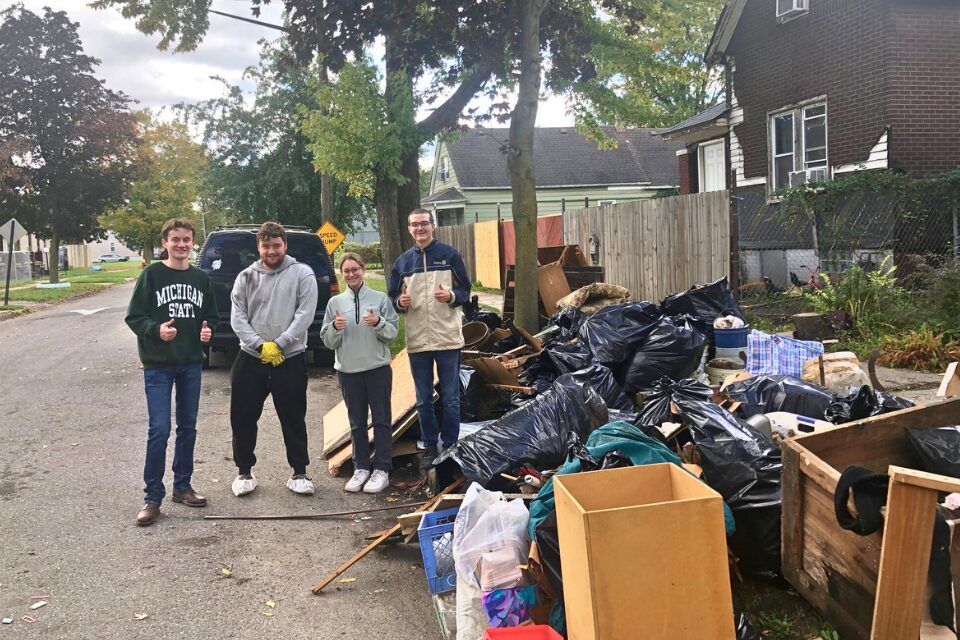
During the ERT training, you will learn more than just technical skills, such as installing a tarp on a roof or sorting debris. You’ll be equipped to give emotional and spiritual support to disaster survivors. So, whether you’re serving in Topeka or Traverse City, Dallas or Detroit, Minneapolis or Marquette, this basic ERT training will give you the communication and relationship-building skills you need to work with people when communities are impacted by disaster.
Disaster response and recovery is a team effort, and United Methodists have been involved in it for many years through the United Methodist Committee on Relief (UMCOR) and its partners. With a “communities own their recoveries” philosophy, UMCOR supports local efforts to accomplish immediate relief and long-term recovery while providing for volunteers to offer compassionate ministry in the aftermath of disasters.
In partnership with annual conferences, UMCOR journeys with affected communities throughout a disaster’s cycle, including disaster preparedness, relief, and recovery. UMCOR’s ERT training program supports conference preparedness and immediate response efforts. Key activities for conference ERT and other response teams are supplying survivors with food, water, shelter, and help with mucking out and cleaning up. ERTs must be led by a trained leader and are only deployed when requested. They do not go unprepared, unannounced, or uninvited.
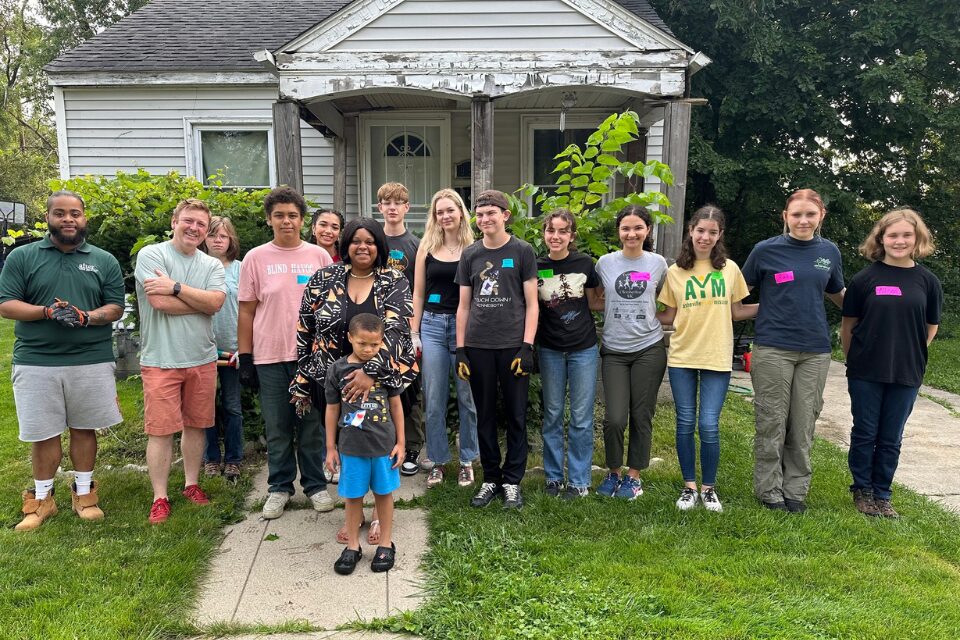
Jody Pratt and Bob Freysinger will lead the ERT training and work closely with Cheryl Tipton and After the Storm for the hands-on portion of the training. After the Storm has assisted flood survivors in Metro Detroit as disaster case managers since 2022. Case management is critical to helping survivors find resources and funding to pay for repairs or replacements in the aftermath of a disaster, so After the Storm is well aware of who still needs help. Read this article to learn more about After the Storm.
Volunteer assistance in cleaning up homes has been a godsend for After the Storm as they help people get back on their feet and back in their homes. The upcoming volunteer service week, from April 15-19, gives United Methodists in Michigan a chance to live out their Christian commitment to helping neighbors with the love of Christ through practical service.
Cheryl Tipton has seen time and again the positive impact this can have on people. “When you’ve lived through a flood, and you’re two years down the road, and you feel like you’ve been forgotten, and then somebody finally comes and helps you, it just makes a difference in the quality of your life,” she says. “It also renews your faith and your hope.”
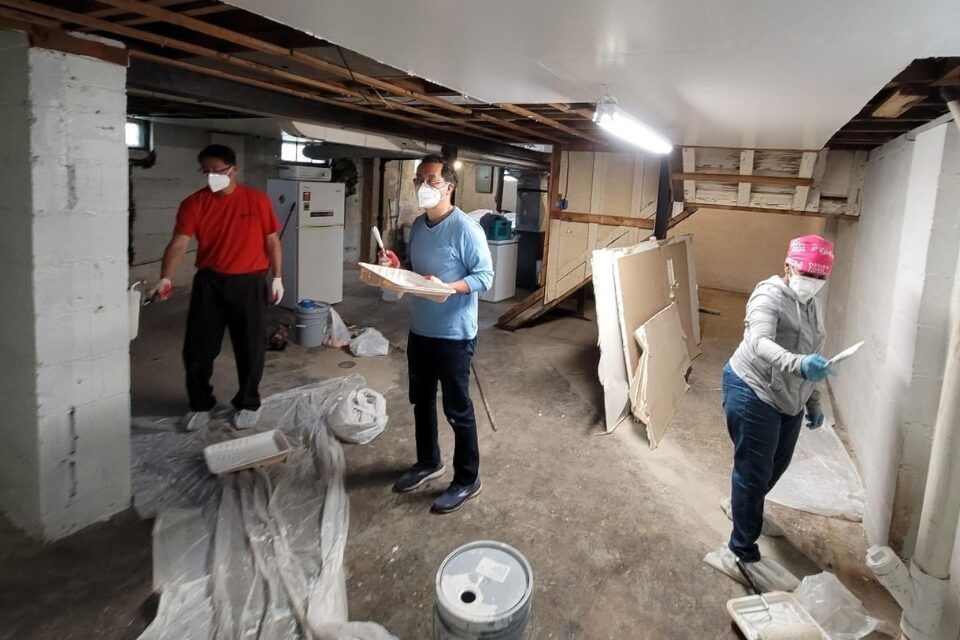
The volunteer blitz is a great way to show how people of faith can step up and do much more than we can individually. Tipton explains, “The camaraderie that happens with After the Storm staff, the survivors, and the volunteers is a good exchange. It’s a community effort. And it’s about connecting neighbors. Without that happening, we don’t get things done. And, at the end of the day, we’re all in this together. Natural disasters don’t discriminate.”
Tipton is deeply grateful for the individuals and church groups that participated in the volunteer blitz that After the Storm hosted last October and believes they will sign up again in April and experience the transformative power of faith-based service.
“We’ve had some great volunteers from United Methodist churches,” notes Tipton. “Last year, volunteers removed debris, painted basements, and did a lot of yard work. Some yards were so overgrown you could barely see their garage! And some of these are seniors who can’t get out. They might have the equipment but aren’t physically able to do the work. So, to see the smiles on their faces once it’s done transforms you. It just makes your heart feel good.”
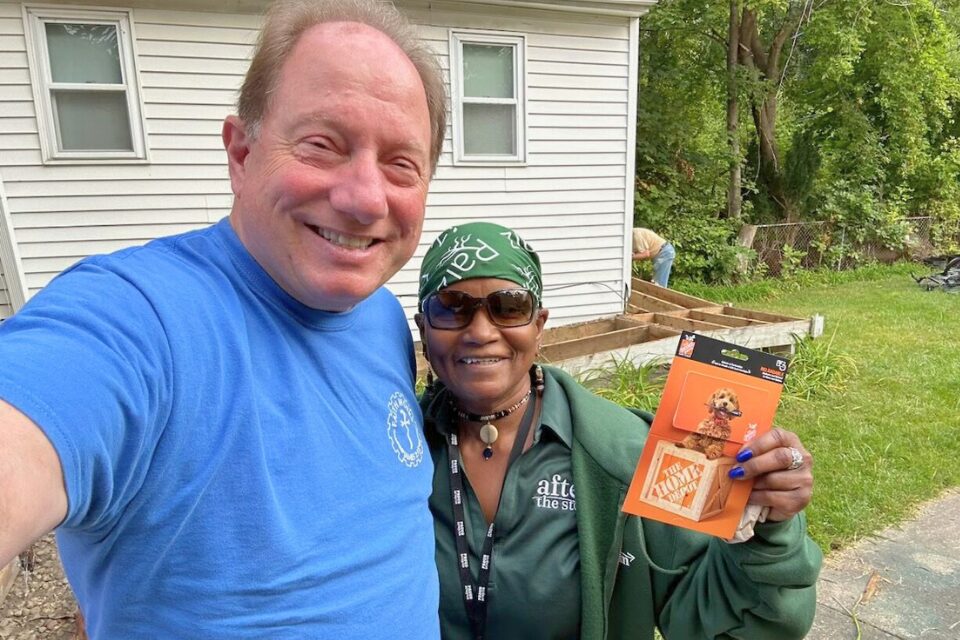
No construction skills are required to join After the Storm — just good work clothes and shoes. After the Storm will provide gloves, masks, and everything you’ll need to clean or assist neighbors. Water and snacks will also be provided. However, if you have dietary restrictions or need food to take with medicine, please bring your food for meals.
Churches and individuals can also donate gift cards from places like Home Depot to purchase items volunteers may need to replace wooden steps and handrails that have been destroyed.
Individuals and churches interested in participating in the volunteer blitz or donating gift cards for purchasing materials should contact Cheryl Tipton, After the Storm’s Disaster Resource Coordinator, at ctipton@afterthestormmi.org or 517-512-4049. Please get in touch with her during business hours, Monday through Friday, 8 am to 4 pm EST.
If you want to further commit to disaster preparedness and recovery, sign up for the optional basic Early Response Team (ERT) training. It’s valuable for your church to know how to respond when natural disasters occur here in Michigan.
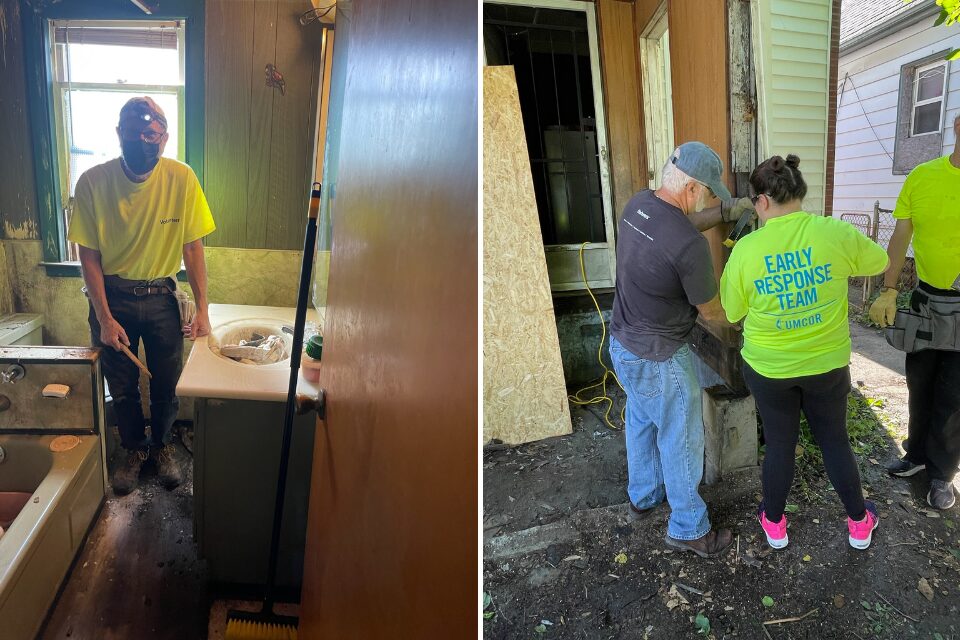
“Part of the education you’ll receive in the ERT training is learning how to discern a church’s role when a disaster strikes,” says Jody Pratt. “The training benefits your church and community because that’s where it all starts. It starts with connecting neighbors and learning how we can help our neighbors. How do we organize a response, from collecting food to providing water, finding places to shower or wash clothes, or helping people find a safe place to stay? Disaster response begins locally, and the ERT training is a great first step.”
Pratt encourages local United Methodist churches to explore this ministry further and send one person to the ERT training. Identify a person in the congregation who has a passion for this kind of work and let them take the training so they can return and educate the congregation. She believes it can make churches better resourced and prepared.
The deadline to register for the ERT training is April 1, 2024. The trainers need a minimum of 10 people to run the class, and there is a maximum of 20 participants. Please email her at prattgji09@gmail.com to register and to get more details.
Last Updated on March 6, 2024

